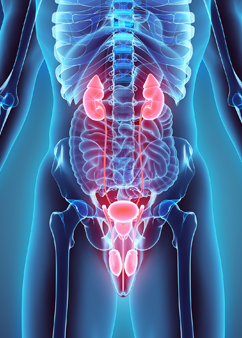


Interstitial Cystitis
Interstitial Cystitis is more commonly known as Painful Bladder Syndrome. This debilitating condition has historically been confused with various other bladder conditions, making it difficult to diagnose. Interstitial Cystitis is defined as “an unpleasant sensation (pain, pressure, discomfort) perceived to be related to the urinary bladder, associated with lower urinary tract symptoms of more than 6 weeks duration, in the absence of infection or other identifiable causes.” (2009 new American IC/BPS Guidelines). While there are several theories that attempt to explain Interstitial Cystitis, the exact cause remains unknown. Many patients with IC have the biomarker APF (antiproliferative factor) in their urine which inhibits bladder cell proliferation, making healing of the bladder lining much more difficult. Research also indicates Painful Bladder Syndrome may be related to systemic neurosensitization and neuroinflammation that can occur within the bladder as well as other organ systems. Interstitial Cystitis results in damage to the urothelium and bladder muscles and can be presented on a scale from mild mucosal irritation to deep Hunner’s ulcers.
INTERSTITIAL CYSTITIS AND ADIPOSE DERIVED MESENCHYMAL STEM CELLS

Adipose derived adult (non-embryonic) mesenchymal stem cells have the ability to seek out areas of injury and regeneration and assist in the repair of nerves, blood vessels, muscle, fat, cartilage, bone, and many other structures. These cells are naturally recruited by cytokines (SDF-1 stromal derived factor one, HGF hepatocyte growth factor, and platelets), to sites of inflammation, ischemia, hypoxia, or injury and they assist in the healing process either by directly forming needed cells or secreting chemical messengers that promote healing. Stem cells are mobilized naturally from bone marrow when the body is healing but they are also found in human adipose tissue. These stem cells from fat are abundant in levels thousands of times greater than those found in bone marrow, and have equivalent regeneration potential to the bone marrow cells. The success of stem cell treatments appears to relate to the number of cells, giving adipose cells a significant potential advantage to regenerate human tissues. Mesenchymal stem cells have been used extensively around the world in the successful treatment of orthopedic, cardiac, pulmonary, and neurologic disease in both humans and veterinary models.
It is thought that adipose derived stem cells are anti-inflammatory and may be able to differentiate into functional smooth muscle cells, and therefore bladder repair by stem cell treatment may be viable for those suffering with Interstitial Cystitis. Patients suffering with IC demonstrate abnormal cell signaling and cytokine release. Stem cell treatment may be helpful for interstitial cystitis patients who exhibit mucosal and smooth muscular damage.
Not all cases or patients respond to stem cell therapy and outcomes will vary from patient to patient.
Would you like to be contacted regarding potential regenerative medicine pilot studies? If so please fill out our Contact Form.
